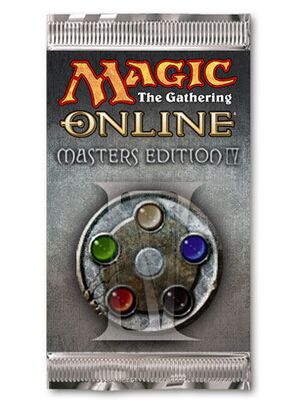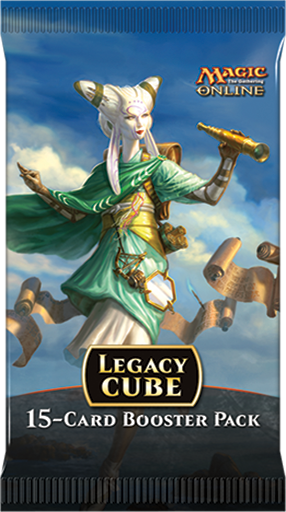Magic Online

Magic Online (abbreviated MOL, previously Magic: The Gathering Online, MTGO, or MODO[note 1]) is the official means of playing Magic: The Gathering over the Internet. Wizards of the Coast launched it on June 24, 2002 with the release of the two year old Invasion set and has since added each new set to its server as well. This causes Magic Online to have slightly different formats than paper Magic. [1] [2] New types of formats include the Pauper Deck Challenge.
Magic Online requires digital cards. [3] They are sold in booster packs just like in stores. [4] Several Magic Online sets and cards are not available in paper Magic.

Sets
All cards from core sets after 7th Edition and expansions after Alliances are fully featured in Magic Online (This included cards in Reserved List, as the reprint policy does not apply in non-paper medium). For cards prior than that and some special sets after Magic Online's launch (like Conspiracy), they are featured in Magic Online exclusive sets or as a part of Treasure Chests instead.
Core sets and Expansions are sold until the set is rotated out from Standard in Magic Online. The other sets are sold in selected time basis (including, but not limited to, as a provided product via limited events).
Recent sets are usually released a week after the paper version's release. Starting from Amonkhet, however, released a week before the paper version's official release date (the same date of prerelease).
Online-only
The following sets are Magic Online Exclusive:
- Masters Edition
- Masters Edition II
- The “Enchantress Rubinia” and “Deathdancer Xira” Commander Theme Decks
- Masters Edition III
- The “Boltslinger” and “Exiler” decks of the short-lived Magic Online Deck Series
- Momir Basic Event Deck
- Masters Edition IV
- Vintage Masters
- Tempest Remastered
- Legendary Cube
Cards
The following cards are Magic Online-only:
- Gleemox: a Magic Online-only promo card that was given away with the announcement of the Gleemax project. They were distributed on Magic Online by Gleemax. The card only exists on Magic Online. It doesn't show up in gatherer because it's not a real-world card. [5]
- Library of Congress: a special card that R&D uses to quickly set up a game state. [6]
Avatars
Avatars are graphical representations of the player's persona or character. Avatar cards were used in casual Vanguard format games. [7] You added one of them to your deck before play, and at the start of the game, the avatar card from your deck started in play for you and applies the modifications listed on it. Starting with Zendikar, rules text and hand size/life total modifications for vanguard avatars was discontinued. You may continue to play the vanguard format with previously avatars. Both old and new avatars can still be used to represent you in-game. [8] [9] [10] Avatars show damage, so they wear away to a skeleton as the owner loses life points. [11]
DCI-Sanctioned Tournaments
Magic online holds DCI sanctioned formats. Some of these are only sanctioned on Magic Online.
- Modern: all sets and cards from Eighth Edition and Mirrodin are allowed. The format was subsequently officially codified two months after its introduction.
- Freeform: all sets and cards are allowed. Regular deckbuilding rules are relaxed.
- Classic: all sets and cards are allowed. Normal deckbuilding rules do apply. Was retired in June 2014 after the introduction of Vintage.
- Pauper: all cards that have been printed as common at least once are allowed.
- Prismatic: each deck must contain at least 250 cards, including at least 20 cards of each color. Was retired in February 2014.
- Singleton: with the exception of basic land cards, a player’s combined deck and sideboard may not contain more than one of any individual card.
- Tribal Wars: emphasizes creature combat: one-third of every deck must be of a creature belong to a subtype.
- Momir Basic: based on the “Momir Vig” Vanguard avatar.
- Cube Draft: played with a especially selected pool of cards. [12]
- Constructed Leagues. [13]

Community Cup
The Magic Online Community Cup is a yearly invitation-only tournament, first held in 2009, in which a group of Wizards of the Coast compete against a group of eight or twelve Magic players selected via a voting system in Magic Online.
Championship Series
The Magic Online Championship Series (MOCS) is a tournament series taking place on Magic Online. Each year, 16 players earn invitations via the MOCS to the Magic Online Championship, an event with a $200, 000 prize purse and a (roughly) one-year period Platinum status special promotion (in paper format) to the winner.
Prizes
In 2015, By far the largest change to Magic Online event structures was the introduction of Play Points, the conversion of most Constructed events to award Play Points as the primary prizes, and the acceptance of Play Points in most events (both Constructed and Limited).[13] Wizards of the Coast made these changes to move away from awarding prizes entirely in boosters, which were mainly of interest to Limited players, primarily to allow Constructed players to more easily use their prizes to rejoin Constructed events.
Issues and controversies
Invasion block shortage
As Invasion block was one of the first sets released on Magic Online, cards of the block are in short supply as the user base was very small at the time.
Judgment spoiler
Due to a mistake, the entirety of Judgment was spoiled via Magic Online when the set was released in the Software too early. This had led to the release of Sets on Magic Online to be several weeks after the release of the physical product. Since Amonkhet, sets are released and become tournament-legal on Magic Online simultaneously when the prerelease event of the physical counterpart has launched.
Instability and suspension of premier events
In November of 2013, after suffering a tournament loss by experiencing technical issues on Magic Online, Magic Pro Tour Hall of Fame member Brian Kibler aired his frustration in an article on Star City Games entitled "The Magic Online Championship Series should not exist".[14] As this server instability and the inability to restore Magic Online Tournaments to certain states had been a longstanding issue, this led to the suspension several types of high profile types of events[15] which have been slowly phased back in since.[16].
As a response towards the problem, The MOCS, along with Pro Tour qualifier and other Premier events was later suspended for almost half a year. Which during that time they dropped the older client and will use the new client which was launched in July 2014. [17] [18] The MOCS and Magic Online PTQ were not resumed until September before WoTC set up a backup plan if similiar cases happened again in future. The suspended MOCS' seasonal make-up events during that Pro Tour season were played between October and December.
Bribery, prize splitting and collusion
In August 2014, WotC issued Bribery, Prize Splitting, and Collusion guidelines that were included in the Magic Online User Agreement. [19]
Magic Digital Next
Magic Digital Next — or "MDN" — is Wizards' internal umbrella term for the entire landscape for Magic: The Gathering experiences around digital games.[20] The Wizards of the Coast–designed game MTG Arena was developed under this new umbrella, succeeding Magic Duels.[21] In September 2017, it was revealed that the two games would exist indepentdenly.[22]
Notes
- ↑ short for "Magic Online with Digital Objects"
References
- ↑ Template:NewRef
- ↑ Template:NewRef
- ↑ Template:NewRef
- ↑ Template:NewRef
- ↑ Template:NewRef
- ↑ Template:NewRef
- ↑ Template:NewRef
- ↑ Magic Online Vanguard
- ↑ Template:NewRef
- ↑ Template:NewRef
- ↑ Template:NewRef
- ↑ Randy Buehler (November 3, 2014) The New Magic Online Legacy Cube. Magicthegathering.com, Wizards of the Coast.
- ↑ a b Template:NewRef
- ↑ Brian Kibler (November 11, 2013.) "The Magic Online Championship Series Should Not Exist", Star City Games.
- ↑ Template:NewRef
- ↑ Template:NewRef
- ↑ Template:NewRef
- ↑ Worth Wollpert (February 23, 2015), Magic Online 2014 Executive Summary. Magicthegathering.com, Wizards of the Coast.
- ↑ Template:NewRef
- ↑ Template:NewRef
- ↑ Template:NewRef
- ↑ Template:NewRef